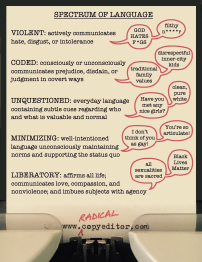
Be a radical copyeditor. When someone says “all lives matter,” engage with them (particularly if you are a white person, like me), and help them understand why saying this makes things worse, not better.
As many people have articulated over the seven years since the Black Lives Matter movement began, no one interrupts a breast cancer awareness event by yelling “all cancers matter,” or defaces “save the rainforest” bumper stickers with “all ecosystems matter,” or blocks a rescue crew from reaching a burning house because “all houses matter.”
“Black lives matter” feels threatening to some people because it challenges the “racial contract” (articulated by philosopher Charles Mills and powerfully discussed by Adam Serwer in his article “The Coronavirus Was an Emergency Until Trump Found Out Who Was Dying“) that white lives are more valuable than Black lives. It denies the lie of colorblindness and the mythology of a post-racial society where people are killed for a reason, get sick for a reason, lose their housing for a reason—and that reason is individual failure, not systemic inequity and hundreds of years of state-sanctioned and state-led violence and injustice.
Some have argued that there’s an invisible “too” on the end of “Black lives matter.” With respect, no, there isn’t. If there’s any invisible word involved, it’s an emphatic “do”: “Black lives DO matter, despite all lies to the contrary.” Saying “Black lives matter, too” keeps white folks right there in the thick of it, the unspoken default humans who naturally and unquestionably matter the most, whose worth goes without saying.
Alicia Garza, one of the founders of the Black Lives Matter movement, says it best. Here she is in a 2015 interview with Laura Flanders of Truthout:
#BlackLivesMatter really started as a love note to our people in the aftermath of the acquittal of George Zimmerman in the murder of Trayvon Martin. … #BlackLivesMatter was an attempt for us to re-humanize us in a world that so profoundly dehumanizes us, and it was a call to action.
… Changing Black Lives Matter to All Lives Matter is not an act of solidarity. What it is is a demonstration of how we don’t actually understand structural racism in this country. When we say All Lives Matter, that’s a given. Of course, we’re all human beings—we all bleed red—but the fact of the matter is some human lives are valued more than others, and that’s a problem.
… We’ve been pushing people to really talk about what does structural racism look like in this country. It’s not about people being mean to each other … it’s about interpersonal dynamics that are backed by systemic power. When we look at that, we see that Black people are on the losing end of every disparity that you can possibly think of. Not only is it not appropriate to not be paying attention to Black lives in this country, but it’s certainly not appropriate to just erase Black from the conversation.
If you need help talking about racism with people who say “all lives matter,” here are a few good quick reads along those lines:
- “How to Argue Against Saying ‘All Lives Matter,’ Because This Has Got to Stop,” by Chris Tognotti and JR Thorpe
- “How to Explain Why Saying ‘All Lives Matter’ Is Wrong to Someone You Care About” by Sukriti Wahi
- “Helpful Rebuttals For Racist* Talking Points” (graphic version / text version) by @CharCubed, inspired by a great Twitter thread by @sujoy_shah
- “How to Talk to Your White Family About Racism” by Sam Reed
- “How to Talk to Other White People About Race (and Why It’s Necessary)” by Kayla Blau
- “How to Talk to Your Non-Black Family Members About Race, According to Therapists” by Julia Naftulin
To close with Alicia Garza again (and if you haven’t read her “Herstory of the #BlackLivesMatter Movement,” you need to):
#BlackLivesMatter doesn’t mean your life isn’t important—it means that Black lives, which are seen as without value within white supremacy, are important to your liberation. Given the disproportionate impact state violence has on Black lives, we understand that when Black people in this country get free, the benefits will be wide reaching and transformative for society as a whole.
When we are able to end hyper-criminalization and sexualization of Black people and end the poverty, control, and surveillance of Black people, every single person in this world has a better shot at getting and staying free. When Black people get free, everybody gets free. This is why we call on Black people and our allies to take up the call that Black lives matter. We’re not saying Black lives are more important than other lives, or that other lives are not criminalized and oppressed in various ways. We remain in active solidarity with all oppressed people who are fighting for their liberation and we know that our destinies are intertwined.
Black Lives Matter.
More posts you might like:



In case you haven’t seen this yet: A linguistic perspective: The harmful effects of responding ‘All lives matter’ to ‘Black lives matter’ http://alpslab.stanford.edu/posts/blm/2020-06-23.html
LikeLiked by 1 person